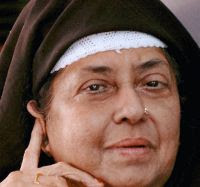Kamala (Das) Surayya — 1934-2009.
Sadanand Menon
Sadanand Menon
It was as if, along with dolls, pent-up fantasies had tumbled out of the Old Playhouse of a nubile lass. Kamala Das’s first collection of poems, Summer in Calcutta, published in 1965, kicked up some dust in the rather placid universe of what was then called ‘Indo-Anglian’ writing. Here was a young woman unleashing a set of languid images redolent with the sensual charge of a white hot summer in which the body wanted to burst out of its bud and blossom in the fullness of the self. English writing in India, long past its tepid middle-age, had just discovered its own sexuality.
It didn’t take the 30-year-old mother of three very long to establish a toehold in the airy portals of Indian writing in English, sparsely populated as it was then with women poets. Popular English periodicals like The Illustrated Weekly of India, Quest, Eve’s Weekly, Femina and Imprint were beginning to devote some space to these new literary trends. Along with Eunice D’Souza, Qurratullain Hyder and Chandralekha, Kamala Das represented the voice of a newly emerging feminine consciousness of the late 1960s and early 1970s, which was not hesitant to bring into public matters otherwise considered personal. Of course, Ismat Chugtai had already opened the account on this front in the Urdu language.
However, to Kamala Das would go the credit of inaugurating a genre of ‘confessional’ writing which was to impact a large number of emerging women writers in English and regional languages who would find the courage to explore their deeper desires and, even more forcefully into the 1990s, their body.
Her subsequent collections of poetry in English like Descendants (1967), Old Playhouse and Other Poems (1973), Alphabets of Lust (Novel, 1977) or Only the Soul Knows How to Sing (1996) continued in much the same vein — the cry of a woman looking to cast aside the fetters and restrictions imposed by a male society. The quality of poetry was inconsistent; but the quality of intensity was sustained.
But it was not until her rather premature, narcissistically self-absorbed and gauche autobiography, My Story in 1976, that Kamala Das earned both a sort of national recognition and national notoriety. Told in a breathless, if padded tone, the narrative played with unrestrained sensuality and seemed more than eager to tell-it-all. While it provoked the conservative and titillated those seeking the salacious, what most people missed in the eager, gushing narrative was the fantasy and humour of it. The writer was simply having a blast and leading on her readers to a space where they might all have secretly wished to go. If, in her poem An Introduction she had written: I am every/Woman who seeks love; in the autobiography she becomes every woman who resolves a life of drudgery by escaping to an exotic garden of forbidden delights. It was ceaseless fantasy in a playhouse of infinite imagination.
The half-a-dozen or more times I met her and had longish conversations, she came through as a sober, self-contented, even conventional woman who was affection and warmth personified. There was no attempt to shock or provoke. But she had her eyes wide open and, during an extended chat with her once in her home in Kerala even as she fussed over her tiny grandchild, she minced no words in berating the literary and political establishment of the State which was chauvinistically male-dominated and sought to put her down.
In her other avatar as Madhavikutty, the front-ranking short-story writer and novelist in Malayalam, this was a criticism well directed. She certainly went through phases of isolation and alienation in the literary landscape of the State, even as she shone as a beacon of hope and aspiration for an emerging generation of women writers, for whom her iconoclasm and ‘coming-out-of-the-closet’ courage (even if it was make-believe) provided a roadmap for both honest and feminist writing.
Kamala (Das) Surayya was, however, no feminist herself. She made no pretence of speaking ‘on behalf’ of anyone or any cause. But her concerns, ranging from creative freedom and the need to dream and express sexual desire within a personal space to openly admit to being in a state of erotic insatiability was to open a valuable ‘womanist’ space within literature and politics.
It proposed an independent, autonomous sexual agency for women uncontrolled and unpatrolled by patriarchal yardsticks. However, the contemporary critic would say the fantasy was largely heterosexual and privileged a romantic space for man represented as the eternal lover, Krishna. For example, in Maggots (1967), a pining Radha laments the departure of Krishna even as a solicitous husband asks her if his kisses hurt. Her reply is quintessential Kamala Das:
What is/ it to the corpse if maggots nip?
Without Krishna, the woman is left to be a pining corpse.
Other excitements in her life included the bold move in 1999 to convert to Islam, making the political claim that, as a woman, she felt more protected in that religion. This, for once, was no fantasy. She stuck to her resolve and stayed true to her belief. It is nothing short of extraordinary that now she is provided a State funeral as a practising Muslim.
Kamala Surayya will be remembered for her writings in English and Malayalam. She will be remembered more for boldly adopting something like a maverick, enfant terrible, feminist posture, which became the window through which radical feminism could soon step in to articulate its sexual politics in India.
In her work, the playhouse metamorphoses into a mansion of real possibilities






No comments:
Post a Comment